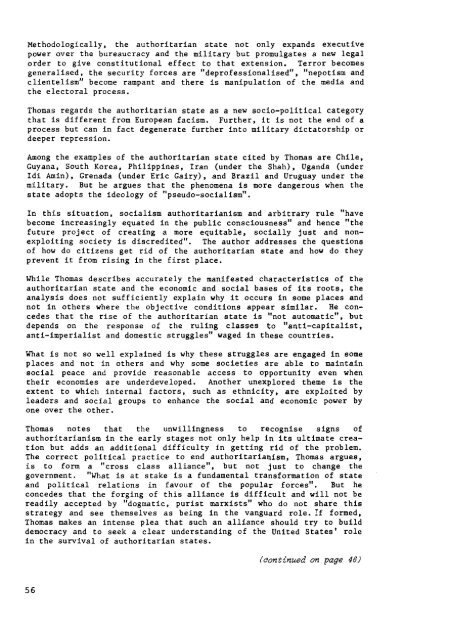Ifda dossier 47, May/June 1985
Ifda dossier 47, May/June 1985
Ifda dossier 47, May/June 1985
You also want an ePaper? Increase the reach of your titles
YUMPU automatically turns print PDFs into web optimized ePapers that Google loves.
Methodologically, the authoritarian state not only expands executive<br />
power over the bureaucracy and the military but promulgates a new legal<br />
order to give constitutional effect to that extension. Terror becomes<br />
generalised, the security forces are "deprofessionalised", "nepotism and<br />
clientelism" become rampant and there is manipulation of the media and<br />
the electoral process.<br />
Thomas regards the authoritarian state as a new socio-political category<br />
that is different from European facism. Further, it is not the end of a<br />
process but can in fact degenerate further into military dictatorship or<br />
deeper repression.<br />
Among the examples of the authoritarian state cited by Thomas are Chile,<br />
Guyana, South Korea, Philippines, Iran (under the Shah), Uganda (under<br />
Idi Amin), Grenada (under Eric Gairy), and Brazil and Uruguay under the<br />
military. But he argues that the phenomena is more dangerous when the<br />
state adopts the ideology of "pseudo-socialism".<br />
In this situation, socialism authoritarianism and arbitrary rule "have<br />
become increasingly equated in the public consciousness" and hence "the<br />
future project of creating a more equitable, socially just and non-<br />
exploiting society is discredited". The author addresses the questions<br />
of how do citizens get rid of the authoritarian state and how do they<br />
prevent it from rising in the first place.<br />
While Thomas describes accurately the manifested characteristics of the<br />
authoritarian state and the economic and social bases of its roots, the<br />
analysis does not sufficiently explain why it occurs in some places and<br />
not in others where the objective conditions appear similar. He con-<br />
cedes that the rise of the authoritarian state is "not automatic", but<br />
depends on the response of the ruling classes to "anti-capitalist,<br />
anti-imperialist and domestic struggles" waged in these countries.<br />
What is not so well explained is why these struggles are engaged in some<br />
places and not in others and why some societies are able to maintain<br />
social peace and provide reasonable access to opportunity even when<br />
their economies are underdeveloped. Another unexplored theme is the<br />
extent to which internal factors, such as ethnicity, are exploited by<br />
leaders and social groups to enhance the social and economic power by<br />
one over the other.<br />
Thomas notes that the unwillingness to recognise signs of<br />
authoritarianism in the early stages not only help in its ultimate crea-<br />
tion but adds an additional difficulty in getting rid of the problem.<br />
The correct political practice to end authoritarianism, Thomas argues,<br />
is to form a "cross class alliance", but not just to change the<br />
government. "What is at stake is a fundamental transformation of state<br />
and political relations in favour of the popular forces". But he<br />
concedes that the forging of this alliance is difficult and will not be<br />
readily accepted by "dogmatic, purist marxists" who do not share this<br />
strategy and see themselves as being in the vanguard role.If formed,<br />
Thomas makes an intense plea that such an alliance should try to build<br />
democracy and to seek a clear understanding of the United States' role<br />
in the survival of authoritarian states.<br />
(continued on page 46)
















